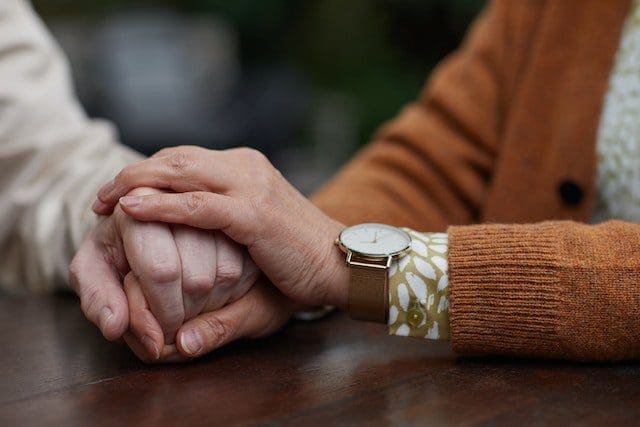“Many disabilities are invisible. Your reaction to them is not.”
Caregivers Worldwide
The International Alliance of Carer Organizations (IACO) is a global network of care organizations working to provide information and resources for caregivers. In June of 2021 it published a study of 18 Countries and reported there were a total of over a hundred and thirteen million caregivers in those countries.source
While every caregiver is unique, we are united by the fact that every day we face the challenge of caring for our loved one without remuneration for our effort – often feeling as if our loved one has no clue what we sacrifice to care for them.
Facing A New Reality
My husband, David Mulligan – a tall, handsome, strapping man – has a second degree karate belt, is a retired Navy Diver, ran a successful travel and incentive business, and was obsessed with exercising. When we first married, I thought “in sickness and in health” meant a cold or the flu. Never did I think, since I’m older than he, that he would be the one struck down with a stroke.
In 2017, shortly after retiring, we built our dream home on Kiawah Island, SC. We walked the beach almost every day, had a great group of friends, played a lot of golf, went to and hosted great dinner parties. Life was good.
But then, one sunny Saturday morning while I was working in my study, I heard a loud thump come from the kitchen. With my heart in my throat and a knot in my stomach, I sprinted into the kitchen. Kneeling next to David as he lay on the ground, I stroked his cheek as I checked his pulse. He was alive! I shuddered with gratitude.
After many years of doggedly trying to find the underlying cause of David’s stroke, the doctors made the diagnosis of Autonomic Nervous System Failure (Dysautonomia), a rare form of Parkinson’s Disease. A symptom of David’s Dysautonomia is that his blood pressure drops 50 points when he goes from lying to standing. There is no cure and only palliative care that helps to relieve symptoms.
When someone you love needs care that only you are there to provide, the weight of the responsibility can cause you to feel stress, resentment, fear, anxiety, unappreciated and overwhelmed. These feelings do not make you a horrible person; they make you a human. Because you are a human, when someone you love falls ill, you perceive what’s happening to them as happening to both of you. It is this perception that may cause the mental anguish that goes along with the weight of responsibility and why it is not only the health of the person being cared for that requires attention, but the health of the caregiver as well.
Understanding the Stress Response
When someone experiences a threatful event, an area of the brain that contributes to emotional processing, called the amygdala, causes the release of high levels of cortisol and adrenaline to provide the energy needed to deal with the situation. This burst of hormones is meant to be short term protection against the threat. The challenge for caregivers is that their body stays revved up while struggling under the weight of what is expected of them. Day after day, caregivers are constantly on guard – making sure they’re doing everything they can to help their loved one. Over time, repeated activation of the stress response takes a toll on the caregiver’s body. Research suggests that this state of chronic stress contributes to high blood pressure, inflammation, obesity, and causes brain changes that may contribute to anxiety, depression, and addiction.source
How the Brain’s Neuroplasticity Can Improve Well-Being
Megan Call, a licensed psychologist and Director of the Resiliency Center at the University of Utah, in her research on resiliency reports that the neuroplasticity of the human brain is highly malleable to learning new strategies that help improve well-being. She recommends that caregivers should schedule a time – for themselves – to learn a skill that is new to them and has some meaning, relevance, or importance. Additionally, mindfulness practices performed on a regular basis will increase a feeling of being able to cope with the situation.source
Dr. Herbert Benson, director emeritus of the Benson-Henry Institute for Mind Body Medicine at Massachusetts General Hospital, in his research studies on stress found that deep abdominal breathing, focusing on soothing words (such as peace or calm), visualization of tranquil scenes, receptive prayer or meditation, create a relaxation response and reduced stress. source
Staying Healthy
Be okay with what you can’t do, focus on the things you can.
Don’t think about your loved one’s illness as your identify.
Only listen to positive chatter in your head.
Take time for yourself.
Anyone who has flown on a plane has heard the instruction:
“If the cabin loses air pressure the mask will drop. Put the mask on yourself before you try to help anyone else.”
It’s so important as a caregiver to remember this on days that you may think if something doesn’t change you’re going to commit suicide or homicide. On those days what needs to change is you – you have to take care of yourself in order to care for another.
The truth is most caregivers at some point feel like giving up. We feel as if what we do is not enough, what we say makes no difference, and hope, positivity and courage are gone. When you feel like this, that’s when you need to TAKE A BREAK. Don’t be afraid of people “caregiver shaming” you – when someone who is not a caregiver criticizes caregivers for expressing their feelings.
Contact organizations like Well Spouse, that support and advocate for people who care for a chronically ill or disabled husband, wife, or partner. With help these moments will pass and you’ll regain your perspective and rediscover hidden strength from the love you have for the person you’re caring for.
Here’s a final thought I hope will give you inspiration:
The wisest thought of the wisest man in Greece was carved over the entrance to the Great Oracle of Delphi in 1400 BC in two words, “Know Thyself.”
These words are as true today as they were then. If you know your limits and heed them, you’ll be able to care for your spouse or partner because you are caring for yourself.





Really great post! There aren’t enough resources about care-giving and it’s something that most everyone experiences at some point in life. Thank you for sharing your story!
Thank you for sharing and for your honesty. Some people don’t understand that you can’t take very good care of others if you, yourself, are depleted. Self-care is not an active of selfishness.
Even if only as a mother or a someone who has had responsibility for a person after an operation, many of us have had a minor caregiver position. All that does is allow us to just kind of understand what a real Caregiver endures. This article is a powerful statement of what happens to a person psychologically and medically if our whole life becomes consumed by that role. It also reinforces the admiration we should have for those who are thrust into that status.
This is so well-written and well researched. Many people could benefit from reading it. Perhaps it could be distributed through various Parkinson’s and caregiver advocacy groups.